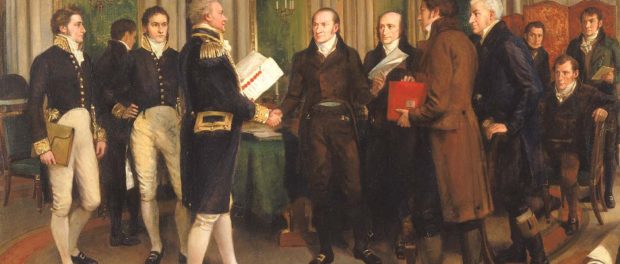1814: The Treaty of Ghent & Other Quebec Curios
Part of “The Canadas in Britain”, 1792-1827
 Amédée Forestier’s depiction of the signing of the Treaty of Ghent, painted in 1912. Photo credit: Wikimedia Commons.
Amédée Forestier’s depiction of the signing of the Treaty of Ghent, painted in 1912. Photo credit: Wikimedia Commons.
In August of 1814, the United States and Britain’s conception of war with each other was starting to wane. At least Britain’s did. With climbing debts and their main objective, that is to say, Napoleon, out of the way, Britain set its sights to end the war with America. The United States sent some of their own to negotiate the treaty one of which was the future President, John Quincy Adams. The British side, whose names were unfortunately lost to history, met their American counterparts in Ghent, Belgium in August. The fruits of their combined efforts, the Treaty of Ghent, was signed in December of 1814. If something seems missing to modern eyes, as in any representation for the Native American communities that helped fight on both sides of the War, this conception was unknown or a non-issue to either side of the time. The Treaty of Ghent helped American expansionism, allowing the Americans to expand beyond the Great Lakes region. Any other form of territorial gains between the Americans and the British were returned to the other side, as it had been before the war started—a status quo ante bellum.
Yet the signing of the Treaty of Ghent did not necessarily mean the war was over between the American and British armies, curiously enough. One of the last stands between the Americans and the British would occur later in January of 1815 when the Americans and the British had a last stand in the town of New Orleans.
Neither side knew that their countries had signed a treaty; news in general still travelled very slow back then. The Americans, commanded by future President Andrew Jackson, were outnumbered by the British by about ten thousand men. However, British battle plans were severely flawed: their plan to cross the Mississippi River was with equipment that the army forgot to take with them. Left without any material to cross the river, the British scrambled to try and find another way across the river, exposing themselves to Jackson’s army. The British commander, Edward Packenham, was killed in action. The battle, over in a half an hour, had a disproportionate amount of deaths: the British, due to their tactical error, had around two thousand men, while the Americans only lost eight men.
Indeed, news travelled so slowly that the population would only hear of the Treaty of Ghent in February, the same month that the American Senate would ratify the Treaty. The American’s ratification officially ended the War of 1812.





